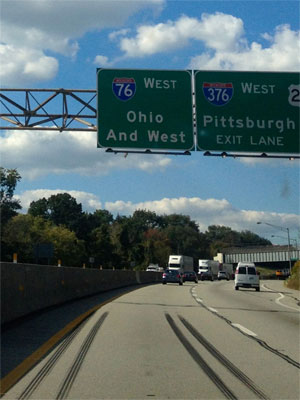Westward Bound
Published 10 years, 5 months past
If you can read this, we’re on our way home to Cleveland. Somewhere on the Pennsylvania Turnpike, at a rest stop or from a passenger seat, I’ve tapped the Publish button in the WordPress iOS app, sending this post forth to tell the word that the second phase of Rebecca’s treatment has come to an end, and we are finally, after so many weeks, on our way home.
Technology has lifted us in so many ways, big and small. The ability to fly Rebecca to CHOP when she was unconscious and at risk of her life. The equipment used to remove the tumor that threatened her, the machines that monitored her brain activity, the shunt that keeps her intracranial pressure low, the arterial port in her chest wall, the massive equipment that fired protons into her skull on precisely calculated vectors into a precisely mapped volume at the center of her brain. The wireless interfaces to the global networks that let us keep in touch with friends and family, watch a movie on demand, research treatment options, buy supplies to be delivered to our temporary residence in Philadelphia, videoconference with our children and parents back in Cleveland. The ability to draft this post ahead of time and then simply publish it with the touch of a button.
People have lifted us in so many ways, big and bigger. The relatives and friends who rushed to our side without a second thought, who did what we asked when we asked without hesitation, who came to see us throughout the whole extended process, who organized to feed and support the family we left in Cleveland, and who came in force to walk for Rebecca and for cancer research. The Philadelphia friends who came to see us for a few hours here and there, who gave us brief breaks away, who checked up on us to see how we were doing. The wonderful people at the University City Arts League, where Rebecca was able to take painting and dance and hula-hoop classes in the afternoons. The fantastic staff at Morey’s Piers, who made sure that the one weekend we could have in Wildwood with the whole family was the best it could possibly be. The incredible staff and even more incredible volunteers who run the Philadelphia Ronald McDonald House, who housed us and fed us and gave us a calm and welcoming space where Rebecca could play with other kids.
The web community lifted us in ways so varied and vast that they very nearly defy belief. When I put out the first call, you were there, instantly and in force, hundreds of you, replying and favoriting and retweeting and liking and commenting and emailing to show your support, your regard, your care. So many well wishes came our way, and every one of them helped us. They’ve continued to help us throughout the process, as people have checked back in or just let us know that they’re still thinking of us. Because whatever you may think about the efficacy of prayer and warm thoughts and good vibrations and karmic loans with regard to medical issues, there is no doubt that the expression of those things help in this way: they let those who are struggling to deal with terrible choices know that they have a support network and resources to draw on, should they be needed. That is a bigger deal than you can imagine, unless you’ve been there yourself.
All those things got us through the first phase, the initial surgeries and recovery; and then through the second phase, the radiation treatment and initial chemotherapy. We’re headed back to a month-long resting period, a brief window of no treatments… and then the third phase will begin: a year (or more) of intensive chemotherapy that will likely have serious side effects, but offers the best chance of eradicating whatever cancer cells may have survived the resection and radiation. This will be a deeply trying year, but we will face it in our home, with the whole family together.
So we’re wending our way through the Appalachian Mountains, looming dark against the twilit sky, leaving behind the city that sheltered us while we fought for our daughter’s life. Ahead of us lies the city that is our home, where we will fight to secure her future. It makes our path forward immeasurably easier to know that so many of you are there to help us. We can never thank you enough.